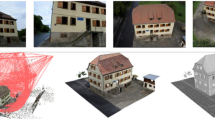Abstract
A state-of-the-art discussion of the fuzzy set theoretic spatial analysis is provided in this paper. Regional concepts and regionalisation, spatial preference-utilitychoice structures, spatial equilibrium, and optimal spatial planning are among the basic issues analysed. Due to imperfect information, systems complexity, and vague cognitive and decisionmaking processes, the conventional two-valued mathematical system appears to be too rigid and less natural in modelling spatial structures and processes. It is demonstrated that fuzzy sets theoretic notions often generalise conventional spatial concepts and provide new perspectives for analysing both static and dynamic spatial systems.
Similar content being viewed by others
References
Bellman, R. E. and Zadeh, L. A. 1970. Decision-making in a fuzzy environment.Management Sciences 17: B—141—164.
Bona, B., Inaudi, D. and Mauro, V. 1980. A fuzzy approach to residential location theory. InProgress in Cybernetics and Systems Research, eds. R. Trappl, G. J. Klin, and L. Ricciardi, 3: 314–20. New York: John Wiley.
Carlucci, D. and Donati, F. 1977. Fuzzy cluster of demand within a regional service system. InFuzzy automata and decision processes, eds. M. M. Gupta, G. N. Saridis and B. R. Gaines, pp. 379–85. Amsterdam: North-Holland.
Gale, S. 1972. Inexactness, fuzzy sets and the foundation of behavioral geography.Geographical Analysis 4: 337–49.
Gale, S. 1976. A resolution of the regionalisation problem and its implications for political geography and social justice.Geografiska Annaler 58B: 1–16.
Leung, Y. 1979. Locational choice, a fuzzy set approach.Geographical Bulletin 15: 28–34.
Leung, Y. 1980. A fuzzy set analysis of sociometric structures.Journal of Mathematical Sociology 7: 159–80.
Leung, Y. 1982a. Approximate characterisation of some fundamental concepts of spatial analysis.Geographical Analysis 14: 19–40.
Leung, Y. 1982b. Market area separation in a fuzzy environment. InFuzzy set and possibility theory, recent developments, ed. R. R. Yager: New York: Pergamon.
Leung, Y. 1982c. Dynamic conflict resolution through a theory of a displaced fuzzy ideal. InApproximate reasoning in decision analysis, eds. M. M. Gupta and E. Sanchez, 381–90. Amsterdam: North-Holland.
Leung, Y. 1983a. A value-based approach to conflict resolution involving multiple objectives and multiple decisionmaking units. InInternational and regional conflicts: analytic approaches, eds. W. Isard and Y. Nagao, pp. 55–72. Cambridge: Ballinger.
Leung, Y. 1983b. A concept of a fuzzy ideal for multicriteria conflict resolution. InAdvances in fuzzy sets, possibility theory, and applications, ed. P. P. Wang, pp. 387–403. New York: Plenum.
Leung, Y. 1983c. Urban and regional planning with fuzzy information. InUrban and regional policy analysis in developing countries, eds. L. Chatterjee and P. Nijkamp, pp. 231–49. Aldershot: Gower.
Leung, Y. 1983d. Fuzzy sets approach to spatial analysis and planning — a nontechnical evaluation.Geografiska Annaler 65B: 65–75.
Leung, Y. 1984a. Towards a flexible framework for regionalization.Environment and Planning A 16: 1613–32.
Leung, Y. 1984b. Compromise programming under fuzziness.Control and cybernetics. 13: 203–15.
Leung, Y. 1984c. Robust programming for spatial optimization problems. Paper delivered at the Systems Analysis and Mathematical Models Workshop of the 24th International Geographical Union, Besancon, France.
Leung, Y. 1985. A linguistically-based spatial classification system. Keynote paper delivered at the NATO Advanced Research Workshop on Analysis of Qualitative Spatial Data, Amsterdam, The Netherlands. InMeasuring the unmeasurable, eds. P. Nijkamp, H. Leitner, and N. Wrigley, pp. 451–86. The Hague: Martinus Nijhoff.
Macmillan, W. D. 1978. An introduction to the theory of fuzzy sets in the context of the construction of representational, spatial economic theory. InTowards the dynamic analysis of spatial systems, eds. R. L. Martin, N. J. Thrift and R. J. Bennett, pp. 38–52. London: Pion.
Nijkamp, P. 1979. Conflict patterns and compromise solutions in fuzzy choice theory.Journal of Peace Science 4: 67–90.
Pipkin, J. S. 1978. Fuzzy sets and spatial choice.Annals, Association of American Geographers 68: 196–204.
Ponsard, C. 1979. On the imprecision of consumer's spatial preferences.Papers, Regional Science Association 42: 59–71.
Ponsard, C. 1980a. Fuzzy economic spaces. Dijon: Institute de Mathématiques Economiques, Université de Dijon, Document de travail No. 43.
Ponsard, C. 1980b. Producer's spatial equilibrium with a fuzzy constraint. Dijon: Institute de Mathématiques Economiques, Université de Dijon, Document de travail No. 46.
Ponsard, C. 1982. Partial spatial equilibria with fuzzy constraints.Journal of Regional Science 22: 159–75.
Tanaka, H., Okuda, T. and Asai, K. 1974. On fuzzy-mathematical programming.Journal of Cybernetics 3: 37–46.
Zadeh, L. A. 1965. Fuzzy sets.Information and control 8: 338–53.
Zimmermann, H.-J. 1976. Description and optimisation of fuzzy systems.International Journal of General Systems 2: 209–215.
Zimmermann, H.-J. 1978. Fuzzy programming and linear programming with several objective functions.Fuzzy Sets and Systems 1: 45–55.
Author information
Authors and Affiliations
Rights and permissions
About this article
Cite this article
Leung, Y. Basic issues of fuzzy set theoretic spatial analysis. Papers of the Regional Science Association 58, 35–46 (1985). https://doi.org/10.1007/BF01935252
Issue Date:
DOI: https://doi.org/10.1007/BF01935252




